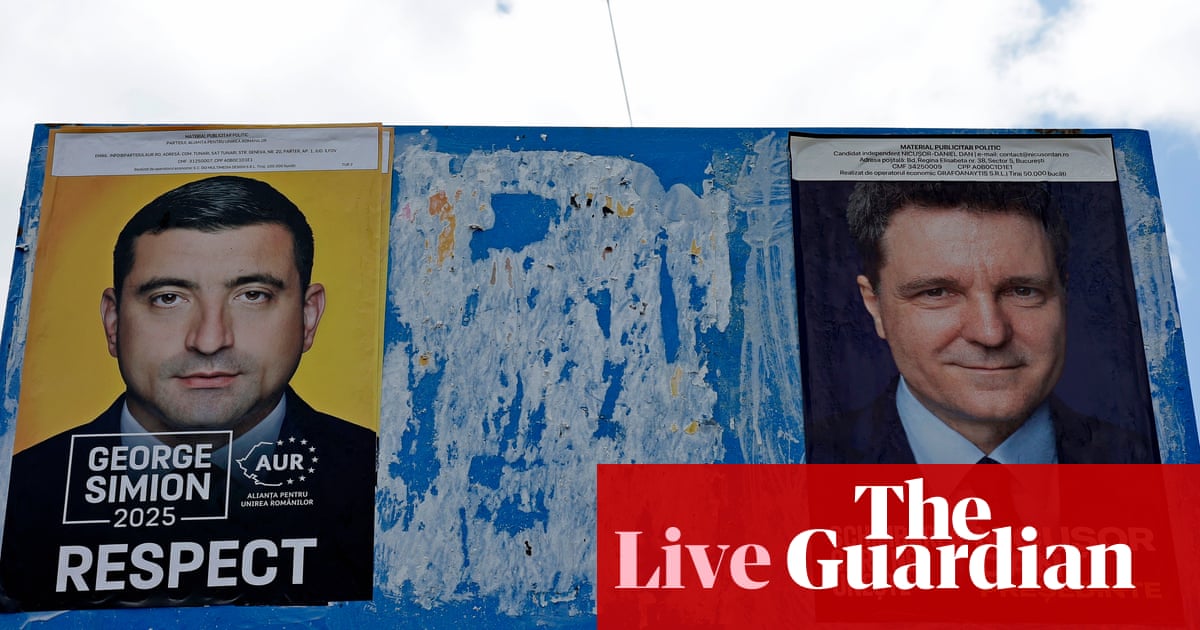Exit poll CURS/Avangarde:
Nicușor Dan 54.9%George Simion 45.1%
Romanian exit polls are expected imminently.
Ready?
Akey point to watch for as the Romanian results start to comein after polling stations close at 9pm local time (8pm CET) will bethe vote of the country’s large diaspora, which in the first round two weeks’ ago voted more than 60% for Simion.
Over the past couple of decades almost 20% of Romania’s population have gone looking for better opportunities abroad and estimates of the current diaspora begin at about 4 million. By 7pm local time,the astonishingly high number of 1.6 millionalready had cast their votes,including over 260,000 in the UK.
“The diaspora has been strongly anti-system for some time, which now means they are strongly far-right,” saidCristian Pirvelescu, head of the National University of Political Studies and Public Administration in Bucharest.
“In Italy, where the Romanian community is more than a million, nearly 75% voted for Simion in the first round.Romanians abroad live in what is a kind of ‘virtual Romania’, very online, and they don’t believe in the traditional media.”
The far-right candidate also did well in Germany and Spain, which have large Romanian communities. “Their vote is a protest vote against the traditional parties, which are seen as corrupt,”saidSciences-Po researcherAntonela Cappelle-Pogacean.
“It’s also a vote with socioeconomic motivations, since in these western societies, the Romanian diaspora is largely working class. Finally, it’s also a vote about identity – they are in a way torn between their rebuilt lives and desire to return to Romania.”
In central and eastern Europe – countries such asPoland, Moldova and Hungary – the pro-European candidate, Bucharest mayor Nicusor Dan, finished first, most likely reflecting Simion’s opposition to sending sending further military aid to Ukraine. There are more than 900 polling stations abroad, with voting allowed over three days.
Whatever its motivations,the diaspora vote– perhaps more than a million ballots, as much as 10% of the first-round total –can clearly swing a tight election.And complicating matters further, few Romanian opinion polls, which are in any case not especially accurate, attempt to predict it.
Interestingly, however, one poll this week that did include voters living abroad showed Simion and Dan neck-and-neck. Turnout both at home and abroad, all observers agree, will be critical on Sunday, with a higher participation rate seen as favouring Dan.
To make things more complicated, Romanian media reported that there are as many asthree companies doing exit pollstonight.
With the race being so close, itmay be best to wait a bit until we make any determinationon the result, but we will bring you them as they drop.
And there is one more element in the Romanian vote that we need to keep an eye on and that makes things more complicated, and that it’sthe (incredibly high) number of diaspora voters.
Over toJon Henleyto explain.
Both candidates in theRomanianelection obviously have long cast their votes.
“This is a turning point, a crucial election,” the Bucharest mayorNicușor Dansaid as he cast his ballot, adding that he voted “for a European direction ... not Romania’s isolation”.
His far-right rivalGeorge Simionsaid he “voted against the inequalities and injustices done to the Romanian people” and “for our future to be decided by Romanian people”.
Romaniansare voting ina pivotal presidential run-offthat could radically alter their country’s strategic alignment and economic prospects.
The Romanian contest,the most consequential of the three, pits a brash, EU-critical, Trump-admiring populistGeorgie Simionagainst a centrist independentNicușor Danin a knife-edge vote that analysts have called most important in the country’s post-communist history.
Recent polls have shownthe gap between the two candidates closing, with one putting them neck and neck and another placing Dan – who has described the vote as a battle between “a pro-western and an anti-western Romania” – ahead.
The vote isa rerun of last November’s ballot, won by a far-right, Moscow-friendly firebrand,Călin Georgescu, who was barred from standing again after the vote was cancelled amid allegations of campaign finance violations and Russian meddling.
Simion has promised to nominate Georgescu, who is under formal investigation on counts including misreporting campaign spending, illegal use of digital technology and promoting fascist groups, as prime minister if he becomes president.
Romanian presidents have a semi-executive role with considerable powers over foreign policy, national security, defence spending and judicial appointments. They can also dissolve parliament if MPs reject two prime ministerial nominations.
We start the night inRomania, so let’s go straight toJon Henleyto quickly bring us up to date on what’s at stake tonight.
Dobry wieczór, boa noite, bună seara,
or simplygood eveningand welcome to our live coverage ofSuper Sunday in Europewith crucial elections inPoland,Portugal,andRomania.
It’sJakub Krupahere, in Warsaw, to guide you through tonight’s exit polls, snap reactions and early results coming from the three EU countries.
We will start withRomaniawhere the polls will close in about half an hour – 7pm BST, 8pm CEST, 9pm local time – followed by Poland and Portugal an hour later.
Romaniansare voting in a pivotal presidential run-off that could radically alter their country’s strategic alignment and economic prospects.
The election pits a brash, EU-critical, Trump-admiring populistGeorge Simionagainst centrist independent Bucharest mayorNicuşor Danin a knife-edge vote that analysts have called most important in the country’s post-communist history.
We will later move toPolandfor the first round of the presidential election there which could be a pivotal moment for the country’s coalition government, and toPortugalwhich hosts its third election in three years.
It may take a little while before we get any conclusive results though as margins are expected to be fairly thin.
But, but, but – don’t worry! We willbring you all the key updates: starting withexit polls, throughsnap reactionsand late polls, all the way tofirst analysesand official results.
I’ll bring you updates from our correspondents acrossEurope, includingJon HenleyandSam Joneswho followed the campaigns in Romania and Portugal, andJennifer Rankinin Brussels.
Ready? Let’s go.
